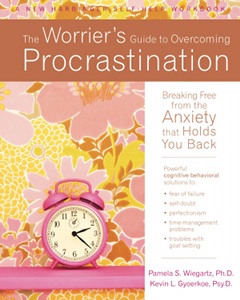Authors outline behavioral solutions to overcome procrastination
Posted by Elena del Valle on May 6, 2011

The Worrier’s Guide to Overcoming Procrastination book cover
Photos: New Harbinger Publications
Putting things off until mañana or the next day is common practice. It has become widespread in people’s personal and professional lives. Many staff and executives today may be living in what my college professors called management by crisis (as opposed to management by objectives). Procrastination often results in last minute rushing, stress and in many cases mediocre or poor presentations, reports and results. Why do we procrastinate? And, for those who want to modify their behavior is it possible to stop procrastinating?

Pamela Wiegartz, M.D., co-author, The Worrier’s Guide to Overcoming Procrastination
Kevin Gyoerkoe, Psy.D., a clinical psychologist, and Pamela Wiegarts, M.D., a psychiatrist, believe shifting the way we think and modifying the rules we live by can have a dramatic effect in reducing the postponing of actions. In The Worrier’s Guide to Overcoming Procrastination Breaking Free from the Anxiety that Holds You Back (New Harbinger, $19.95), a 159-page softcover book published in 2010, they address the topic.
The first step toward change, according to them, is to be aware of the rules we follow sometimes without even realizing it. For example, people often believe they should avoid difficult situations, they say, when in fact they should deal with the anxiety a situation provokes by facing it instead of avoiding it. Another reason people wait, they believe, is because they are seeking perfection.
Instead, the coauthors suggest readers accept less than perfect results that allow them to move forward rather than remaining stagnant awaiting perfect results that may never come. Fear of failure is another reason to procrastinate the coauthors cite in their book. They point out that failure is part of life and it should not stop us from taking action. Another flawed perspective, according to them, is to think that if something is boring or less than pleasant we shouldn’t have to do it; they counter that there are times we have to do things that are not fun and the sooner we do them the sooner we can go back to doing fun things.
Their book is divided into 13 chapters and four main parts, Learn About Your Anxiety and Procrastination, Change Your Mind About Anxiety and Procrastination, Get Moving on Your Goals, and Maintain Positive Change. Each chapter includes exercises, follow up suggestions and a summary at the end.
Wiegartz, coauthor of 10 Simple Solutions to Worry and The Pregnancy and Postpartum Anxiety Workbook, is director of CBT services and training in the Department of Psychiatry at Brigham and Women’s Hospital in Boston and is on the faculty at Harvard Medical School.

Kevin Gyoerkoe, Psy.D, co-author, The Worrier’s Guide to Overcoming Procrastination
In addition to this book, Gyoerkoe is coauthor of 10 Simple Solutions to Worry and The Pregnancy and Postpartum Anxiety Workbook. He is codirector of the Anxiety and Agoraphobia Treatment Center, a group practice in Chicago and Northbrook, Illinois. He teaches courses on cognitive behavioral therapy at the Chicago School of Professional Psychology, has been certified by the Academy of Cognitive Therapy, and serves on the Scientific Advisory Board of OCD in Chicago.

Click here to buy The Worrier’s Guide to Overcoming Procrastination










